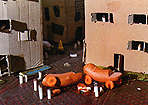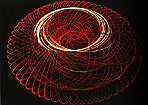
|
|
Apr. 22, 1997
|
Art Watch Index - Mar. 25, 1997
![]()
<<In a Restless World>>
Tour exhibitions

Ein Unfall
The Way Things Go
Son et lumiere
Surrli
"Peter Fischli David Weiss: In a Restless World"
ArtistGuide: Peter Fischli / David Weiss http://www.artistguide.com/ artists/fischli_peter_ _weiss_david.html
FISCHLI AND WEISS
Wexner Center for the Arts
San Francisco-Museum of Modern Art
The Institute of Contemporary Art, Boston
Kunstmuseum Wolfsburg
|
Peter Fischli & David Weiss,
The nihilism of worldly drama Because the events and the world of everyday life are so axiomatic (it is so felt in our unconscious), they do not bring us powerful impressions or amazement in most cases. However, the pleasure of discovering such an amazement, when it suddenly surfaces from the wall of worldly life, is especially great. Still, is there truly an amazement or drama hidden behind it? What if that is a cleverly created fabrication, in other words, if the amazement were a creation of what we unconsciously waited for with the objective of becoming amazed? What if there existed no surprise or impression, only phenomena which continue meaninglessly...? Such a thought makes us feel insecure. People live everyday carrying an impulse of wanting to give meaning to the world and life. This is especially so in the modern world where mythology is lost, with only objects and information flying past at accelerated speed. Of course, there is no amazement nor drama in the world. Such things are born only in the psychology of man which expects those to happen. If this can be mutually accepted, the world will be able to share, and be filled with drama. A restless obsession Although this exhibition is small in scale, it introduces Fischli & Weiss's works from the '70's until today, featuring worldly events or scenery seen from various angles. As a result, an utterly banal and materialistic pathos and drama are created (this is the objective) through the clay works and sculpture having the motif of a kitchen or peanuts, and through photography structured as a story combining elements such as chairs, bottles and sausages (at times, these have exaggerated titles). These are the moments when meaning is given (at least, it seems so), as if god has descended on them. Inside a large vase as tall as our chest, a question about the world or life, posed as a monologue (e.g. "Am I liked by everyone?") is written starting from the bottom of the vase, in the shape of a whirlpool. That is then written in variation in the form of a rotation of the record on a player, or a film that shows only the camera going around inside a hole. It is the world of the "state of things" where the influence continues through constant transference. De-centricism was seen in the various daily sceneries on the many monitors (there, beyond the superficial difference, everything appears as repetitious and equivalent), which were shown in the Swiss pavilion at the Venezia Biennale. "Restless" - a world that is restless and insecure, constantly moving and never becoming still/cannot become still. An obsession in which one is overwhelmed with doubts, and is forced to continue to look for the raison d'etre for the world and himself. What if the world merely exists there, indifferent to such desires of man? The exposed meaninglessness of the world By combining totally unrelated things arbitrarily, Fischli & Weiss brings in a momentary spark. Theirs is a totally cool-headed creation of an accident or encounter. In reality, the world exists independently, merely functioning on its own, and when coincidentally, various things encounter or collide with each other, people try to find some kind of meaning in them. They plausibly fabricate an arrangement of meaning from phenomena. People, who are stranded in this world, seek for a "rest" (a ground which forms their basis). Fear towards meaninglessness is a product of man's insecurity. In such a virtual world made up of those delusions, Fischli & Weiss expose the fictitiousness by intentionally adding contingent elements. The meaninglessness of the world oriented in their work also unexpectedly exposes the meaninglessness of art. I would also like to add that the architectural space, the Wexner Center for the Arts, by Peter Eisenmann, worked in concert with the type of obsession emanating from the works by Fischli & Weiss. [Yukiko SHIKATA/Art Critic]
|
|
|
|
|
|
|
|
|
Apr. 22, 1997
|
[home]/[Art Information]/[Column]
Copyright (c) Dai Nippon Printing Co., Ltd. 1997
Network Museum & Magazine Project / nmp@nt.cio.dnp.co.jp


